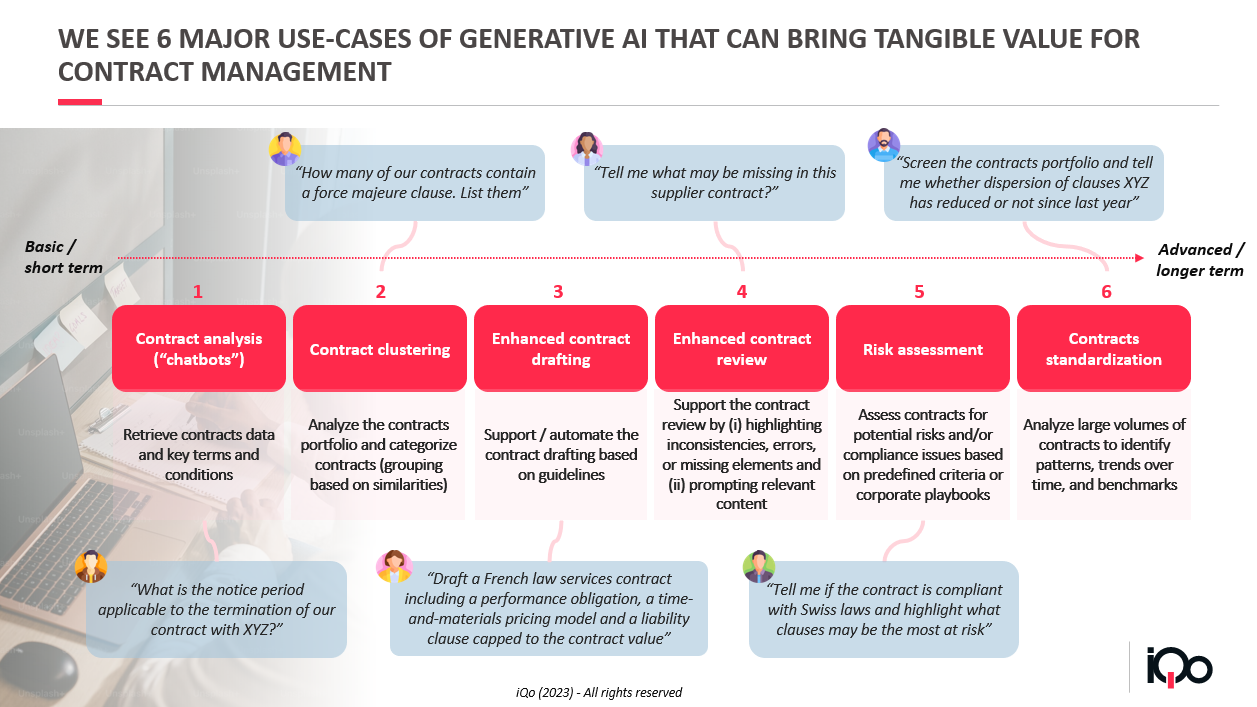Generative artificial intelligence (GenAI), symbolized by the rise of ChatGPT in particular, is generating as much excitement as it is questioning in many fields, and the Contract Management is no exception. Generative AI holds out the seductive promise for businesses of a productivity increase of up to 40%, including for skilled workers, as illustrated by study conducted jointly by MIT and BCG.
But what about the adoption of generative AI in contract management?

Generative AI and Contract Management : where do companies stand?
According to our observations, on the corporate side, only a few simple use cases have been tested to date, mainly of the "contract chatbot" type aimed at rendering key information contained in a contract (parties, clauses, due dates, main obligations, applicable law...).
This discovery or experimentation phase responds to the need to familiarize ourselves with the technology and explore its potential applications, with a view to possible larger-scale deployment.
For their part, software publishers, notably the world leaders in Contract Lifecycle Management (CLM), are investing heavily in the development of platforms, sometimes "multi-LLM*", to integrate these technologies into their existing solutions. Their aim is to demonstrate that Generative AI is not the preserve of stand-alone solutions.
* LLM is a family of Deep Learning algorithms that can perform a range of natural language processing (NLP) tasks, including consistent text generation.
40% of companies are announcing increased investment due to advances in generative AI.
Source: The state of AI in 2023: Generative AI's breakout year
What are the main use cases for Generative AI at Contract Management ?
We have identified 6 use cases for generative AI applied to contract management and tested the majority of them on the basis of a "premium" public version of ChatGPT.
Each of these use cases presents different levels of maturity and a potential for transforming Contract Management 's activities over the longer or shorter term, as illustrated in the following diagram.

-
Contract analysis
Finding key information in contracts and general terms and conditions -
Contract clustering
Analyze a set of contracts and categorize them (grouping them according to certain detected similarities). -
Improved contract drafting
Support and automate contract drafting according to defined guidelines -
Improved contract verification
Assist in the analysis and reading of a contract by highlighting inconsistencies, errors or missing elements, while suggesting content to be added. -
Risk assessment
Assess contracts for potential risks and compliance issues according to predefined criteria and company guidelines. -
Contract standardization
Analyze large volumes of contracts to identify patterns and trends over time
Semantic analysis difficulties hold back Generative AI for the Contract Management
It should be noted, however, that although the results are promising, even the simplest cases such as "contract chatbot " or "contract clustering" still come up against semantic analysis difficulties.
- For example, a "contract summary" cannot simply capture information such as the name and description of the main items, without extracting the key data useful for operational management.
- Similarly, the ability to compare or categorize contracts (clustering), by sorting and grouping them according to their similarities, comes up against the difficulty of composing coherent groups, with discriminating differences between categories.
- Also, when it comes to contract drafting, while the tool is capable of composing a draft contract with relevant generic clauses, it quickly proves incapable of justifying proposals (explicability) or guaranteeing overall consistency. The most it can do is identify gaps, risks or potential errors, and invite the user to concentrate on reviewing the most sensitive clauses, without directly proposing modifications or corrections.
Promising results from the use of generative AI for the Contract Management
To date, the first results obtained with the public version of ChatGPT are promising, but are limited to an "assisted" review process, the production of basic templates, and general advice on sensitive clauses.
It's a safe bet that progress will be rapid, provided thatthe models are perfected and customized to meet the specific needs of businesses, so as to deliver the real productivity gains announced.
In France, labor productivity has been slowing down over the past twenty years, particularly in relation to our main competitors in Europe (Germany) and the United States (source CAE). This slowdown in productivity represents a challenge worth 140 billion euros of GDP (according to the CAE).
The development of AI therefore represents not only a technological breakthrough for companies , but also a unique opportunity to halt the erosion of productivity, while developing new skills for employees, on more complex tasks.
However, according to the MIT and BCG study, the conditions under which generative AI is used are also important: misuse of these tools can have a negative effect on the performance of employees who instinctively follow AI recommendations.
Employees are therefore urged to subject the results obtained by AI to critical scrutiny, and to exercise "cognitive effort and expert judgment when working with generative artificial intelligence systems".
Our next article will explore in greater detail the obstacles and limits to the adoption of generative AI and how you can experiment with this technology in your business.
Further information

Generative AI: how will it change business models?
The steady advance of generative AI is radically changing the way economic sectors derive value. It's a change

Digital resilience: Cloud, data and AI
End-to-end control and management of the data collection, storage, processing, analysis and exploitation chain for data collected on

How can you better manage contractual risks?
Knowing how to manage contractual risks means knowing how to anticipate and avoid financial losses due to a buyer who fails to honor a contract, or to a company that

